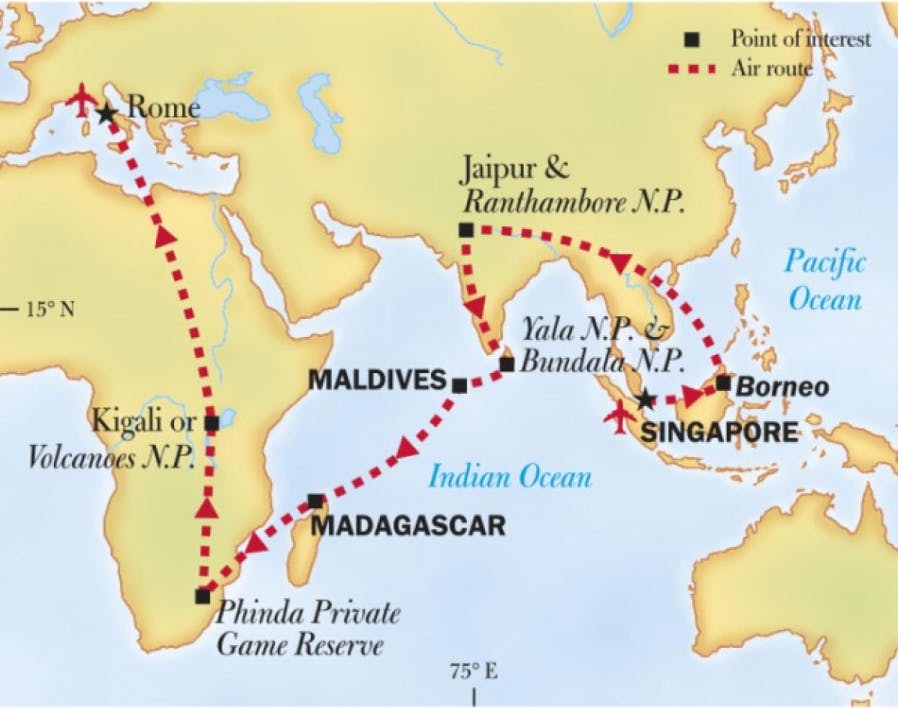As Earth Day approaches, one of the world’s most widely-respected conservation education brands has irked Singapore’s sustainability community with a promotion that takes the super-rich to remote corners of Asia and Africa by private jet to observe endangered species.
With prices starting from US$99,995, National Geographic’s “Wildlife of the World by Private Jet” expedition kicks off in Singapore this month with a trip to Singapore Zoo and a stay at the Fullerton Bay Hotel, then heads off to Malaysian Borneo to see critically endangered orangutans, India to watch endangered Bengal tigers, and Rwanda to observe the last of the mountain gorillas, among other places.
The expedition is promoted as an opportunity to see “rare and unusual creatures that National Geographic has photographed and studied for decades”, accompanied by a team of wildlife experts.
To continue reading, just sign up – it’s free!
- Get the latest news, jobs, events and more with our Weekly Newsletter delivered to you free.
- Access the largest repository of news and views on sustainability topics.
- You can publish your jobs, events, press releases and research reports here too!
Newsletter subscribers do not necessarily have a website account. Please sign up for free to continue reading!
Guests will stay in “best available” luxury accommodation and jet around in a private Boeing 757 with VIP-style leather seating, an expedition chef and a dedicated luggage handler. The 24-day trip ends in Rome. The same excursion is planned for next year.

A map of NatGeo’s wildlife tour via private jet. Image: nationalgeographic.com
The expedition will involve nine different flights on a private jet. Guests are expected to make their own way to Singapore where the tour begins.
Eco-Business was alerted to the tour by an event to promote the excursion at the Fullerton Bay hotel in Singapore on Tuesday (19 April), a day before it kicks off.
Kate Yeo, a campaigner for youth group Singapore Youth for Climate Action, who represented Singapore at the COP27 climate talks last year, said the tour not only undermines National Geographic brand’s credibility in the sustainability space, it is the epitome of climate injustice.
“It’s ridiculous. Flying across the globe in private jets, staying in luxury hotels, relaxing on “private, white-sand beaches”… these activities are only affordable to wealthy people, highly energy-intensive and ultimately the costs of those emissions will be borne by the most climate-vulnerable communities – and endangered wildlife,” she said.
A spokesperson for SG Climate Rally, a Singaporean campaign group, noted that private jet travel is five to 14 times more pollutive than a commercial plane per passenger.
One passenger’s carbon emissions on this trip is roughly 5.25 tonnes, equivalent to 19 economy-class return trips to Bali, or the annual emissions of 40 Rwandans – the final stop on the itinerary – the spokesperson said, citing calculations made using an emissions calculator.
“Learning about biodiversity is important, but we hope to see this done in a more equitable and just way,” they said.
“Trips like these are not only contradictory to the sustainable business travel guidelines that National Geographic themselves have for their own staff, but throw into question the kind of environmental principles the organisation stands for overall as a major sustainability advocate.”
National Geographic’s sustainability policy encourages its own employees to use “sustainable business travel practices” that include “the most fuel-efficient, low-emission, and economical transportation.”
It also encourages staff to use mass transit rather than taxis or rental cars, stay in green-certified hotels, and travel “only when absolutely necessary”.
The expedition makes no mention of the climate cost of private air travel and does not promote carbon offsets as a way to mitigate the environmental impact of the trip.
National Geographic has been runnning similar trips by private jet to visit UNESCO World Heritage sites and a trip around Asia described as “an Eastern odyssey” targeted at wealthy American retirees.
National Geographic has not responded to Eco-Business’s multiple requests for comment.
National Geographic Society is one of the world’s biggest non-profit scientific and educational institutions and has promoted environmental conservation since its founding in 1888.
The society has since spawned a multinational media brand that owns the famous wildlife magazine, television channels, a website, events and other media properties. The National Geographic media brand was acquired by News Corporation’s Fox in 2015, and later became majority-owned by Walt Disney in 2019 after the firm acquired Fox.
The acquisition troubled some readers who fretted about the impact of being a for-profit enterprise on the brand’s mission to “to use the power of science, exploration, education, and storytelling to illuminate and protect the wonder of our world.”

















